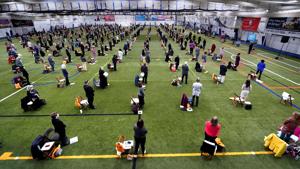Justice Department sides with New Hampshire Democrats in remote access dispute

(The Center Square) – The U.S. Department of Justice is siding with New Hampshire Democrats in a dispute with GOP leaders over remote access to meetings for lawmakers with disabilities.
In an amicus brief filed with the U.S. Court of Appeals for the First Circuit, the Justice Department said New Hampshire House Speaker Sherman Packard can’t claim that the Legislature is immune from the federal American with Disabilities Act and the Rehabilitation Act to deny a group of Democratic lawmakers remote access to meetings.
“The Speaker is incorrect that legislative immunity protects his decision to require plaintiffs’ in-person attendance – that is, to deny their requests for reasonable accommodation,” Assistant Attorney General Kristen Clarke wrote in the 31-page brief. “Legislative immunity is a form of personal immunity for individual legislators, not a form of state sovereign immunity.”
In February, House Democratic Leader Renny Cushing, D-Hampton, and several other lawmakers filed a lawsuit alleging Packard, R-Londonderry, was violating the Americans with Disabilities Act by refusing to provide accommodations for 28 lawmakers with health concerns when the 400-member House of Representatives moved back to indoor meetings earlier this year.
The lawmakers argued that their disabilities put them at heightened risk for COVID-19 infections.
U.S. District Court Chief Justice Landya McCafferty rejected the lawsuit, determining that Packard has broad immunity from any litigation challenging the House’s rules and operations.
However, that decision was reversed in April by a three-judge panel of the appellate court, which ruled that the ADA and federal Rehabilitation Act superseded any claim of legislative immunity.
Clarke noted in the Justice Department’s brief that New Hampshire “waived” any immunity from ADA accommodations by accepting federal relief funds “that went, among other things, to supporting legislative operations during the COVID-19 pandemic.”
“Accordingly, the doctrine of legislative immunity has no application in this action because the state, which is the real party in interest, cannot claim it,” she wrote.
In a statement, Cushing welcomed the Justice Department’s decision to get involved in the case, saying it reaffirms the plaintiffs’ arguments that Packard is ignoring federal laws.
“The Speaker had several opportunities to settle this matter which he did not see fit to take advantage of,” Cushing said. “The result is a legal position that is essentially an argument that he is above the law. We do not believe he is, and we do not believe that the court of appeals will so hold.”
New Hampshire lawmakers have been squabbling over access to remote and in-person meetings since the outset of the pandemic last year.
Former House Speaker Dick Hinch, R-Merrimack, died of COVID-19 on Dec. 9, less than a week after being sworn in at the outdoor session at the University of New Hampshire at Durham.
Republicans were criticized for holding the event in person amid the pandemic, and many lawmakers skipped the event, opting instead to take the oath of office virtually.
Democratic lawmakers have sought to update the House’s rules to allow remote voting during the pandemic, but the effort has been rejected by Republican leaders.
The six-member appellate court is expected to hear oral arguments in the case in September.
Disclaimer: This content is distributed by The Center Square
